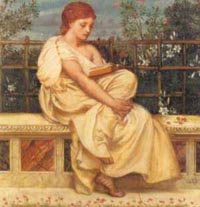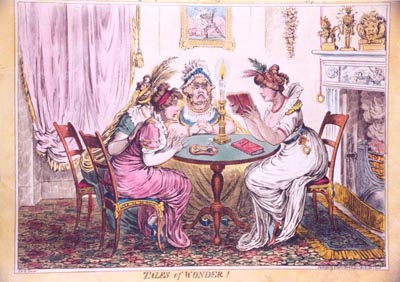 |
Engl 209: Reading Histories: Making ReadersWinter Term 2012, Tues 6:30-9:20 pm., HC 2-11 David S. Miall |
Course description | Reading | Schedule | Assignments | Projects | Other resources | Course Policies | Other Essentials
Course Description
 The institution of literature has been considered a relatively recent
invention, its advent being located in the Renaissance or the mid-Eighteenth
Century. The work of establishing literature meant not only consolidating a range of
textual and generic features that would count as literary, but also creating
a readership responsive to the consumption of literature (usually conceived
to correlate with the development of bourgeois identity). The emergence of
the idea of literature, as Trevor Ross has argued, may hinge in particular
on the shift in focus from writer to reader, from invention to reception;
it also centres on the identification of specific aesthetic criteria that,
eventually, require the disinterested reader and the division of literature
into high and low categories. Following the establishment of a literary
canon by the mid 19th Century, English literature was formulated as a discipline
in the university, distinct from the classics and from philological study:
this occurred first in the U.S.A., then in Britain during the 1920s. In addition
to critical and historical readings, we will also consider two novels that
were published at critical moments during the history of reading and that
raise the question of what is literary.
The institution of literature has been considered a relatively recent
invention, its advent being located in the Renaissance or the mid-Eighteenth
Century. The work of establishing literature meant not only consolidating a range of
textual and generic features that would count as literary, but also creating
a readership responsive to the consumption of literature (usually conceived
to correlate with the development of bourgeois identity). The emergence of
the idea of literature, as Trevor Ross has argued, may hinge in particular
on the shift in focus from writer to reader, from invention to reception;
it also centres on the identification of specific aesthetic criteria that,
eventually, require the disinterested reader and the division of literature
into high and low categories. Following the establishment of a literary
canon by the mid 19th Century, English literature was formulated as a discipline
in the university, distinct from the classics and from philological study:
this occurred first in the U.S.A., then in Britain during the 1920s. In addition
to critical and historical readings, we will also consider two novels that
were published at critical moments during the history of reading and that
raise the question of what is literary.
We will interrogate the history of reading in several ways by analysing:
- the assumptions about literature and society that underlie the construction of the history of English literature, i.e., by asking how satisfactorily the prevailing critical discourse about power and class can account for the phenomenon of literary reading;
- who, as far as can be estimated, was reading what texts (canonical and otherwise) from the 18th to the 20th centuries, given that historical study of readers (e.g., Jonathan Rose) may call the standard account into question;
- in what respects individual readers experience shifts in cultural perspective and identity in response to their reading, an issue that wewill look at in the light of both historical and empirical studies.
Reading and booklist
Books required (available in university bookstore):
Finkelstein, David and Alistair McCleery, Eds. The Book History Reader, 2nd ed. Routledge.
Austen, Jane. Northanger Abbey. Broadview Press.
Braddon, Elizabeth. Lady Audley's Secret. Broadview Press.
Other readings will be provided through a related website. In the schedule below BHR refers to a chapter in The Book History Reader.
Schedule
Tentative|
week of
|
reading
|
notes, optional reading
|
| Jan 10 | Introductions; reading now and in history. Lecture notes; short story, "The Trout" | |
| Jan 17 | Reading now -- readings of "The Trout"; "Trout" report; Iser, BHR (391) / Miall, "Necessity" | Literariness / Iser: notes / Miall: notes |
| Jan 24 | Reading in history: Ong, BHR (134); Darnton, BHR (9); Darnton, "First Steps" /
History overview |
<-- print out Darnton "First Steps" to bring to class, or read on computer Darnton ppt notes |
| Jan 31 | Chartier, BHR (87); Chartier notes; Certeau, Michel De. "Reading
as Poaching." De Certeau notes |
Kloek & Kruif, "Readers and Reading Behavior" |
| Feb 7 | Case Study I: Wordsworth, "Tintern Abbey" / Tintern: early reviews / Rutherford reads "Tintern"; Graff, "Oratorical Culture" | Commentaries;
Ward, "'Came From Yon Fountain' .."; Klancher, "Romantic Theory" Miall, "Tintern" (2000) |
| Feb 14 | 15-19th C readership: Altick, BHR (440); Rose, BHR (424); Native
Readers / Rose notes |
Kaufman, "Innerpeffray" Essay 1 due |
| Feb 21 | Reading week | |
| Feb 28 | Wittmann, Reinhard. "Was there a Reading Revolution ..?" / summary; Colclough, Stephen M. "Procuring Books"; notes & figures; Chartier, BHR (157) | Bourdieu, "Introduction" Wittmann questions / previous |
| Mar 6 | Sutherland, BHR (345); Orlando intro. Isobel Grundy; Flint, BHR (416); |
|
| Mar 13 | Case Study II: Austen. Northanger
Abbey. Reviews of Northanger;
Austen passages / Kaufman, "In Defence of Fair Readers" |
Ross, "The Emergence of 'Literature'";
view of Bath by Nattes (1804); Austen
website
|
| Mar 20 | Northanger Abbey, cont. Benedict, Barbara M. "Sensibility by the Numbers" / Notes |
Sicherman, Barbara. "Reading and Middle-Class Identity" / notes |
| Mar 27 | Case Study III: Braddon, Lady Audley's Secret; Braddon intro; Course Summary |
|
| Apr 3 | Lady Audley's Secret, cont. Flint, Kate. "Sensation Fiction." / notes |
|
| Apr 10 | Final examination (2 hours) |
|
Assignments
Essay topics.
Essay 1, due Feb 14. Consider the figure and role of the reader, as this has emerged so far in your readings for the course. What is the evidence for reading and its contexts, and how might we assess it? (1000 words)
Essay 2, due Mar 27. Choose your own topic, based on the work that has most interested you during the term. (1500 words)
Projects. Students will work in small groups of 4-5, and be assigned a project presentation date to be noted in the schedule. You will consider the readings undertaken that day or in the week or two prior to the presentation and choose one or more topics on which to present points for analysis or debate. For example, you might follow up two or three of the references provided in a chapter or article that appear interesting. Or you might consider the reader implied in one of the literary texts we will be reading, or look at early reviews of the text. A presentation will, preferably, be accompanied by visual aids (Powerpoint, web page, etc.). At the class session following the presentation, each student in a group will hand in a short report informally explaining something about why you pursued that topic and evaluating the presentation (500 words approx.). You will receive a grade for the project overall and a grade for the short report.
Exam. This will be held during the final evening of the course, April 10th, at 6:30 (two hours).
Assignment grades. Assignments will be marked on the university standard 4-point letter grade scale, where A = excellent, B = good, C = satisfactory, and D = poor/minimal pass.
The marks will be weighted as follows:
Term work (worth 70% of final grade):
Essay 1: 25%
Essay 2: 45%
Project: 30% (20% project, 10% short report)
Examination (worth 30% of final grade)
Other resources
International Society for the Empirical Study of Literature and Media (IGEL)
SHARP: The Society for the History of Authorship, Reading & Publishing
Empirical Studies of Reading: Miall and Kuiken website
Streetprints. Ballads, chapbooks, etc., from late 18th and early 19th centuries.
William B. Warner, Staging Readers Reading. (Includes analysis of pictorial representations of readers.)
Hogan, Patrick Colm. "Ethnocentrism and the very idea of literary theory." College Literature 23, (Feb, 1996). (online version)
Course policies
Attendance: If you miss a class, please contact a classmate (not the instructor) before the next class to find out what you missed. Classes will begin promptly at the scheduled time.
Late Policy: Essays must be handed to the instructor at the beginning of the class session at which they are due. They must not be a) given to another student to submit, b) put under the instructor's office door, or c) faxed, or otherwise attempted to be submitted through the English Department office, or d) emailed to the instructor (unless arrangements to do so have been made ahead of time). An essay submitted in this or any other unauthorized way will be considered as having not been submitted and will receive no grade.
The penalty for late papers is a half-grade point per day, including weekends (e.g., a B will become a B-). Late papers may be accepted without penalty if the student has compelling grounds and speaks to or emails the instructor about an extension at least one day before the assignment is due.
Final Exam: The final examination questions will cover the entire course. You will not be able to make up a missed exam unless you provide a medical certificate or some other compelling personal reason for absence. Term work will not be reconsidered after the final examination has been written.
Plagiarism: Note that essay writing must be your own work. A student in whose work plagiarism is detected will face serious penalties, as outlined in the student code.
Other essentials
Policy about course outlines can be found in section 23.4(2) of the University Calendar.
The University of Alberta is committed to the highest standards of academic integrity and honesty. Students are expected to be familiar with these standards regarding academic honesty and to uphold the policies of the University in this respect. Students are particularly urged to familiarize themselves with the provisions of the Code of Student Behaviour (online) and avoid any behaviour which could potentially result in suspicions of cheating, plagarism, misrepresentation of facts and/or participation in an offence. Academic dishonesty is a serious offence and can result in suspension or expulsion from the University.
Because of the seriousness of plagiarism and cheating, it is suggested that students review the definitions of cheating and plagiarism and the related penalties available in the Code of Student Behaviour from the link above; ignorance is not acceptable as a defence in cases of academic offences.
The pictures above are:
Sir Edward Poynter (1836-1919). Reading (1871).
James Gillray (1757-1815). Tales of Wonder!! (1802). Bruce Peel Special
Collections Library, University of Alberta.
Document created August 31st 2006 / updated February 2nd 2012